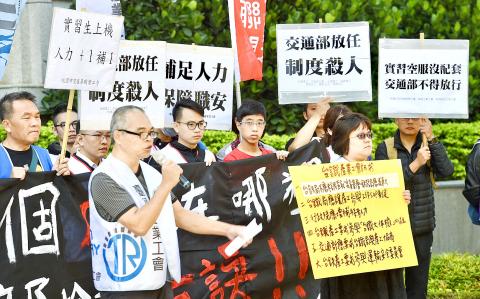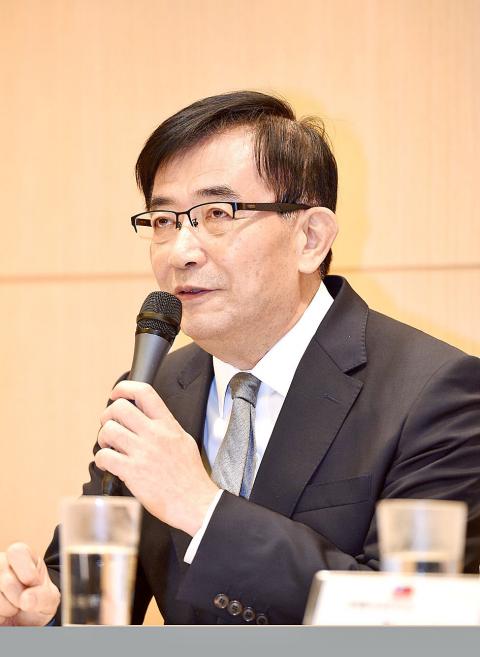The Executive Yuan yesterday announced that Deputy Minister of Transportation and Communications (MOTC) Chang Cheng-yuan (張政源) is stepping down to assume the post of Taiwan Railways Administration (TRA) director-general.
The change — effectively a demotion from a deputy minister to an agency director — is part of the government’s efforts to reform the TRA following a derailment on Oct. 21 that killed 18 passengers and injured 190.
Chang used to work at the TRA and is now returning to the railway agency to reform it after serving in the second-highest position at the ministry, the Executive Yuan said, adding that he does not carry the “baggage” of the TRA, despite being a former TRA employee.

Photo: Peter Lo, Taipei Times
“The ministry originally considered allowing Chang to serve as acting TRA director-general while maintaining his position as deputy minister, but doing so would contravene regulations governing the appointment of government personnel,” the Executive Yuan said in a statement.
However, Chang does not mind taking on a lower position and being paid a lower salary, the statement said, adding that he has resigned as deputy minister to become the TRA director-general.
“We thank him for accepting this commission voluntarily and hope that he can successfully implement reforms at the TRA,” it said.

Photo: Peter Lo, Taipei Times
With a doctoral degree from National Chiao Tung University’s Department of Transportation and Logistics Management, Chang was the station master at the Taipei Railway Station from 1987 to 1991.
He also served as tourism division director at the Taipei Economic and Cultural Office in New York and Tainan Bureau of Transportation chief during Premier William Lai’s (賴清德) tenure as city mayor and was later promoted to Tainan deputy mayor.
MOTC Minister Wu Hong-mo (吳宏謀) told a news conference that the ministry had asked Chang his opinion about leading the TRA.
“He was very passionate about it and said that he was capable of doing the job. As the TRA’s operations are now under heavy public scrutiny after the accident, we decided to choose someone from a higher official to handle this matter,” Wu said.
Speaking about the TRA’s reforms, Wu said that 1,907 of the 2,818 job vacancies approved by the Executive Yuan have been filled, some of whom are undergoing training for their new jobs.
An estimated 3,000 new employees would be added to the workforce in two years, Wu said.
The ministry would also utilize the funds from the annual budget allocated to the TRA as well as from the Forward-Looking Infrastructure Development Program to reduce operational risk on certain railway sections, including those that sharp curves or that are frequently damaged by landslides, Wu said.
Regarding standard operating procedures for deactivating the automatic train protection (ATP) system — a device that ensures train drivers stay within the speed limit set for each section — Wu said that the TRA does not have clear regulations on the speed limit when the ATP is turned off.
“Until the agency issues clear regulations on this matter, Puyuma Express and Taroko Express trains are to have two train drivers on board instead of one,” Wu said, adding that the change would take effect today.
Chang was yesterday in Taitung to meet with relatives of those who died in the train derailment when the Executive Yuan announced his appointment.
He later said in an interview with local media that an ad hoc task force is now stationed in Taitung to help injured passengers with their medical treatment and families of the deceased with funeral arrangements.
The task force would also assist the families in seeking compensation from the TRA, he said.
Chang vowed to help boost TRA employees’ morale and to ensure that the agency strictly adheres to safety procedures.
He said he would also help the TRA regain the public’s trust and respect.
President Tsai Ing-wen (蔡英文) and the premier have vowed to find the cause of the accident, Chang said, adding that he hoped the public would support the TRA and give it more encouragement.
The ministry’s promise was met with doubts from members of Taiwan Railway Union.
“It does not matter who the new TRA director-general is going to be if the agency keeps rejecting reforms,” union secretary Hsiao Nung-yu (蕭農瑀) said.

CHAOS: Iranians took to the streets playing celebratory music after reports of Khamenei’s death on Saturday, while mourners also gathered in Tehran yesterday Iranian Supreme Leader Ayatollah Ali Khamenei was killed in a major attack on Iran launched by Israel and the US, throwing the future of the Islamic republic into doubt and raising the risk of regional instability. Iranian state television and the state-run IRNA news agency announced the 86-year-old’s death early yesterday. US President Donald Trump said it gave Iranians their “greatest chance” to “take back” their country. The announcements came after a joint US and Israeli aerial bombardment that targeted Iranian military and governmental sites. Trump said the “heavy and pinpoint bombing” would continue through the week or as long

TRUST: The KMT said it respected the US’ timing and considerations, and hoped it would continue to honor its commitments to helping Taiwan bolster its defenses and deterrence US President Donald Trump is delaying a multibillion-dollar arms sale to Taiwan to ensure his visit to Beijing is successful, a New York Times report said. The weapons sales package has stalled in the US Department of State, the report said, citing US officials it did not identify. The White House has told agencies not to push forward ahead of Trump’s meeting with Chinese President Xi Jinping (習近平), it said. The two last month held a phone call to discuss trade and geopolitical flashpoints ahead of the summit. Xi raised the Taiwan issue and urged the US to handle arms sales to

State-run CPC Corp, Taiwan (CPC, 台灣中油) yesterday said that it had confirmed on Saturday night with its liquefied natural gas (LNG) and crude oil suppliers that shipments are proceeding as scheduled and that domestic supplies remain unaffected. The CPC yesterday announced the gasoline and diesel prices will rise by NT$0.2 and NT$0.4 per liter, respectively, starting Monday, citing Middle East tensions and blizzards in the eastern United States. CPC also iterated it has been reducing the proportion of crude oil imports from the Middle East and diversifying its supply sources in the past few years in response to geopolitical risks, expanding

Pro-democracy media tycoon Jimmy Lai’s (黎智英) fraud conviction and prison sentence were yesterday overturned by a Hong Kong court, in a surprise legal decision that comes soon after Lai was jailed for 20 years on a separate national security charge. Judges Jeremy Poon (潘兆初), Anthea Pang (彭寶琴) and Derek Pang (彭偉昌) said in the judgement that they allowed the appeal from Lai, and another defendant in the case, to proceed, as a lower court judge had “erred.” “The Court of Appeal gave them leave to appeal against their conviction, allowed their appeals, quashed the convictions and set aside the sentences,” the judges